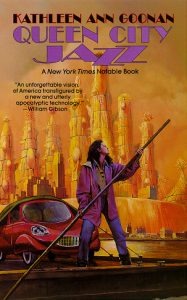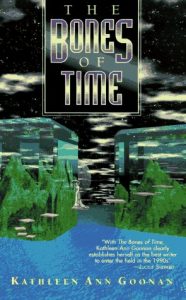Kathleen Ann Goonan (1952-2021)
 The Fantasy Hive is sorry to hear of the passing of Kathleen Ann Goonan. An American science fiction writer with an abiding love of jazz music, Goonan’s Nanotech Quartet revitalised post-cyberpunk speculative fiction in the late 90s and early 00s. She won the John W. Campbell memorial award and was nominated for the Arthur C. Clarke Award. She leaves behind a remarkable body of work that has been praised by writers as varied as William Gibson, Kim Stanley Robinson and Joe Haldeman.
The Fantasy Hive is sorry to hear of the passing of Kathleen Ann Goonan. An American science fiction writer with an abiding love of jazz music, Goonan’s Nanotech Quartet revitalised post-cyberpunk speculative fiction in the late 90s and early 00s. She won the John W. Campbell memorial award and was nominated for the Arthur C. Clarke Award. She leaves behind a remarkable body of work that has been praised by writers as varied as William Gibson, Kim Stanley Robinson and Joe Haldeman.
 Goonan’s most enduring creation is the Nanotech Quartet, beginning with her first novel Queen City Jazz (1994) and continuing with Mississippi Blues (1997), Crescent City Rhapsody (2000) and Light Music (2002). These striking novels portray an America transfigured by Alien nanotechnology and biotechnology. Goonan shows us a world in which humans link through modified pheromone receptors, animals have been uplifted into talking telepathic beings, giant modified bees transfer information through the streets, nanotech flowers bloom from the tops of buildings, and plagues of rogue nanotechnology run wild. The novels are key explorations of a posthuman world, in which new and vital forms of embodiment grow out of the familiar human. The first two novels follow the quest of a clone called Verity to resurrect her dead boyfriend, free Cincinnati from psychic control and escape down the river to New Orleans. Crescent City Rhapsody is a prequel that shows in fascinating detail our familiar world transforming into Goonan’s nanotech posthuman future. All four books marry Goonan’s love of jazz with her love of mind-blowing science fiction, drawing parallels between the improvisatory nature of jazz and the chaotic yet logical path of evolution. Goonan’s lyrical prose, diverse range of characters, and playfully experimental approach to storytelling make the books a unique read. Mere years after Neal Stephenson’s Snow Crash (1992), with cyberpunk still in full flow, Goonan was reconfiguring the possibilities of the genre and how speculative fiction could imagine a future beyond cyberpunk.
Goonan’s most enduring creation is the Nanotech Quartet, beginning with her first novel Queen City Jazz (1994) and continuing with Mississippi Blues (1997), Crescent City Rhapsody (2000) and Light Music (2002). These striking novels portray an America transfigured by Alien nanotechnology and biotechnology. Goonan shows us a world in which humans link through modified pheromone receptors, animals have been uplifted into talking telepathic beings, giant modified bees transfer information through the streets, nanotech flowers bloom from the tops of buildings, and plagues of rogue nanotechnology run wild. The novels are key explorations of a posthuman world, in which new and vital forms of embodiment grow out of the familiar human. The first two novels follow the quest of a clone called Verity to resurrect her dead boyfriend, free Cincinnati from psychic control and escape down the river to New Orleans. Crescent City Rhapsody is a prequel that shows in fascinating detail our familiar world transforming into Goonan’s nanotech posthuman future. All four books marry Goonan’s love of jazz with her love of mind-blowing science fiction, drawing parallels between the improvisatory nature of jazz and the chaotic yet logical path of evolution. Goonan’s lyrical prose, diverse range of characters, and playfully experimental approach to storytelling make the books a unique read. Mere years after Neal Stephenson’s Snow Crash (1992), with cyberpunk still in full flow, Goonan was reconfiguring the possibilities of the genre and how speculative fiction could imagine a future beyond cyberpunk.
 Goonan’s work outside of the Nanotech Quartet is also noteworthy. The Bones Of Time (1996), with its exploration of a colony of illegal clones, shares many thematic concerns with the Quartet and was nominated for the Arthur C. Clarke Award. In War Times (2007) is an alternate history that imagines technological advancement leading to peace rather than the Cold War after World War II, and features many of her jazz heroes. It won the John W. Campell Award and was chosen as the year’s best science fiction novel by the American Library Association. It was followed by a sequel, This Shared Dream (2011), exploring the idea of conflict across alternate timelines and realities. A collection of short stories, Angels and Your Dogs, was published in 2012. Although Goonan has published no novels since then, she leaves behind an incredible legacy in the Nanotech Quartet and her three other novels. These books will continue to challenge the way we imagine humanity’s future for years to come.
Goonan’s work outside of the Nanotech Quartet is also noteworthy. The Bones Of Time (1996), with its exploration of a colony of illegal clones, shares many thematic concerns with the Quartet and was nominated for the Arthur C. Clarke Award. In War Times (2007) is an alternate history that imagines technological advancement leading to peace rather than the Cold War after World War II, and features many of her jazz heroes. It won the John W. Campell Award and was chosen as the year’s best science fiction novel by the American Library Association. It was followed by a sequel, This Shared Dream (2011), exploring the idea of conflict across alternate timelines and realities. A collection of short stories, Angels and Your Dogs, was published in 2012. Although Goonan has published no novels since then, she leaves behind an incredible legacy in the Nanotech Quartet and her three other novels. These books will continue to challenge the way we imagine humanity’s future for years to come.
